Migration guide: version 6.0 to 7.0
Version 7.0.0 of the Genesis platform requires Java version 17 and gradle version 8.3.
If you have an existing application running on version 6 of the Genesis platform and you are using gradle, these instructions will enable you to migrate to version 7 of the platform without difficulties. For applications running on older versions of the platform, please contact your Genesis representative.
Upgrade references to the artifacts
To migrate an existing application to version 7.0.0:
In your gradle.properties file, bump up genesisVersion and all modules in the application to 7.0.0.
genesisVersion=7.0.0
authVersion=7.0.0
deployPluginVersion=7.0.0
Modify the build
- Update your server/jvm/build.gradle.kts file so that it references Java 17 (including compiler options) and Kotlin 1.9.
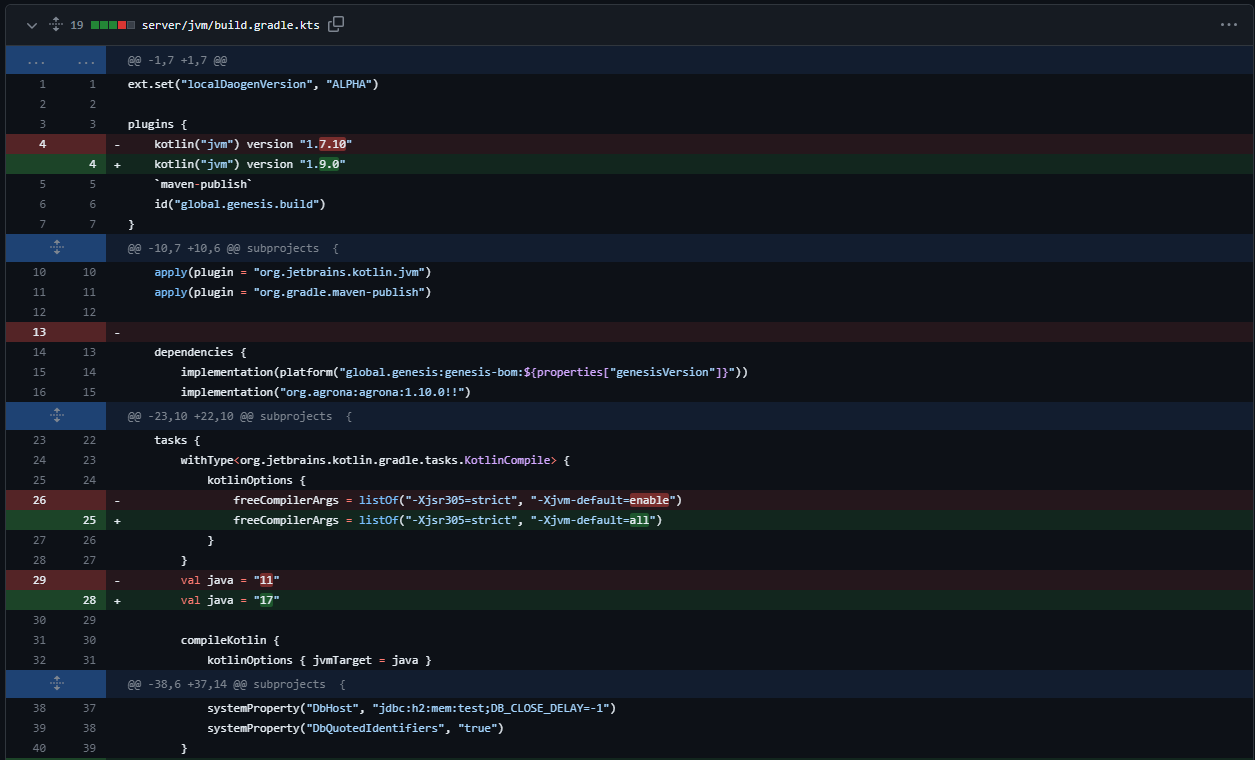
Still in the server/jvm/build.gradle.kts file, add the required directives to support Junit 5 and properties to run tests.
...
subprojects {
...
tasks {
...
test {
systemProperty("DbLayer", "SQL")
systemProperty("DbHost", "jdbc:h2:mem:test;DB_CLOSE_DELAY=-1")
systemProperty("DbQuotedIdentifiers", "true")
useJUnitPlatform()
// Add exports and opens so ChronicleQueue can continue working in JDK 17.
// More info in: https://chronicle.software/chronicle-support-java-17/
jvmArgs = jvmArgs!! + listOf(
"--add-exports=java.base/jdk.internal.ref=ALL-UNNAMED",
"--add-exports=java.base/sun.nio.ch=ALL-UNNAMED",
"--add-exports=jdk.unsupported/sun.misc=ALL-UNNAMED",
"--add-exports=jdk.compiler/com.sun.tools.javac.file=ALL-UNNAMED",
"--add-opens=jdk.compiler/com.sun.tools.javac=ALL-UNNAMED",
"--add-opens=java.base/java.lang=ALL-UNNAMED",
"--add-opens=java.base/java.lang.reflect=ALL-UNNAMED",
"--add-opens=java.base/java.io=ALL-UNNAMED",
"--add-opens=java.base/java.util=ALL-UNNAMED",
"--add-opens=java.base/java.nio=ALL-UNNAMED" // this one is opened for LMDB
)
}
...
}
}
...
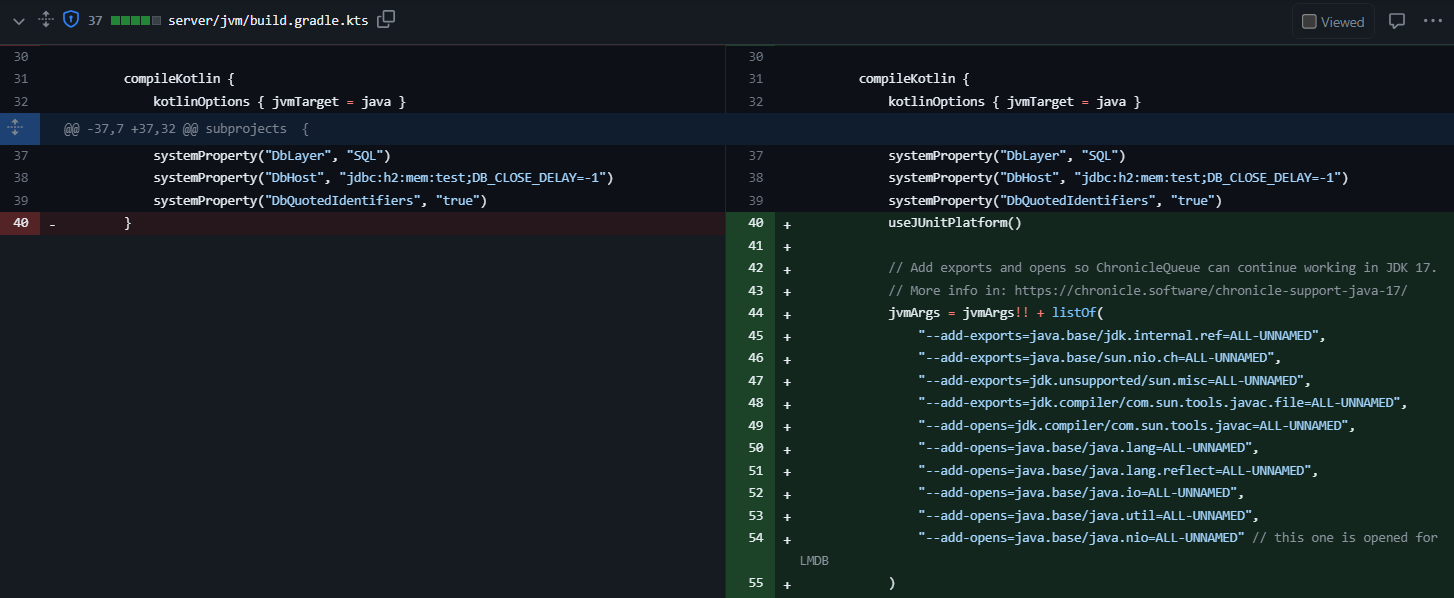
Lastly, configure the copyDependencies task and replace JavaLanguageVersion.
...
subprojects {
...
tasks {
...
//testing should use H2 mem db
test {
systemProperty("DbLayer", "SQL")
systemProperty("DbHost", "jdbc:h2:mem:test;DB_CLOSE_DELAY=-1")
systemProperty("DbQuotedIdentifiers", "true")
}
afterEvaluate {
val copyDependencies = tasks.findByName("copyDependencies") ?: return@afterEvaluate
tasks.withType<Jar> {
dependsOn(copyDependencies)
}
}
}
}
tasks {
...
}
allprojects {
...
kotlin {
jvmToolchain {
(this as JavaToolchainSpec).languageVersion.set(JavaLanguageVersion.of(17))
}
}
...
java {
toolchain {
languageVersion.set(JavaLanguageVersion.of(17))
}
}
...
}
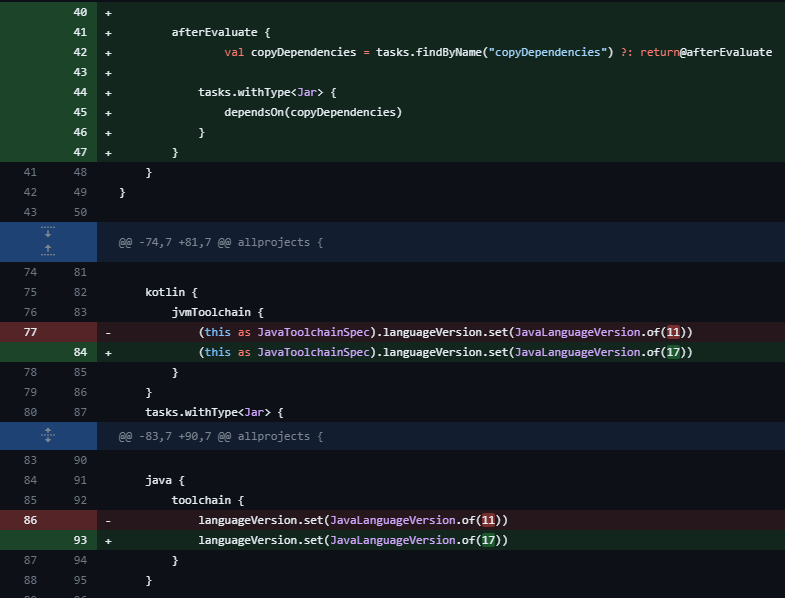
- In the ** server/jvm/-application_-site-specific/build.gradle.kts ** file, configure the
copyDependenciestask:
...
// To give custom name to the distribution package
tasks {
copyDependencies {
enabled = false
}
distZip {
archiveBaseName.set("alpha-site-specific")
archiveClassifier.set("bin")
archiveExtension.set("zip")
}
}
...
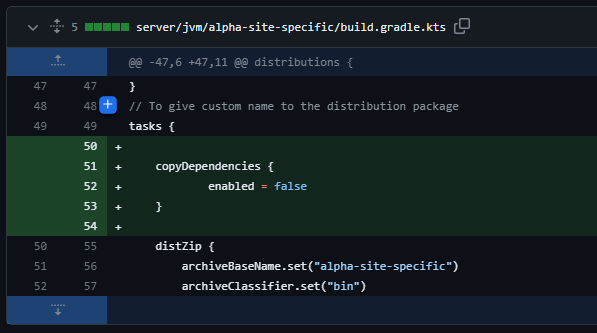
- In the file server/jvm/-application_- distribution/build.gradle.kts file, configure the
distTartask:
...
tasks {
distTar {
mustRunAfter(":alpha-deploy:copyDependencies")
}
distZip {
...
}
...
}
...
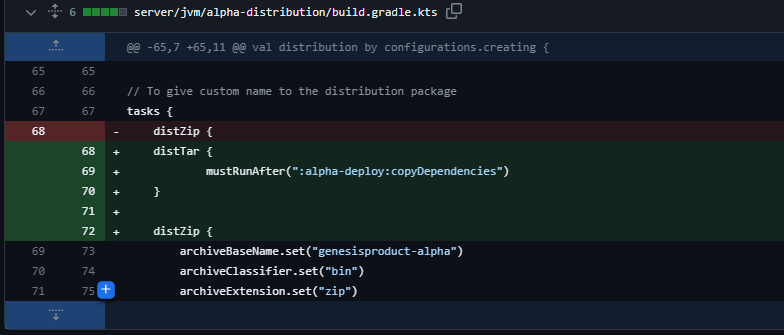
Finishing
Before running the final commands, make sure your Java and Gradle are running using the required versions (Java 17 and Gradle 8.3).
java -version
gradle -version
Also, make sure your environment variables are set properly, specially JAVA_HOME and PATH.
After modifying the gradle files, open a terminal in the folder where you have your project; then upgrade the gradle wrapper:
gradle wrapper --gradle-version=8.3
Then you need to repeat the command in the server/jvm folder:
cd server/jvm
gradle wrapper --gradle-version=8.3
After you have done this:
- If everything has worked, a distribution will be generated - congratulations! You have migrated your application to Genesis 7.
- If there are errors, you need to search through the release notes for all your modules to check for breaking changes.